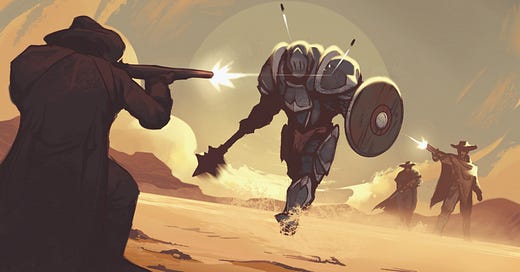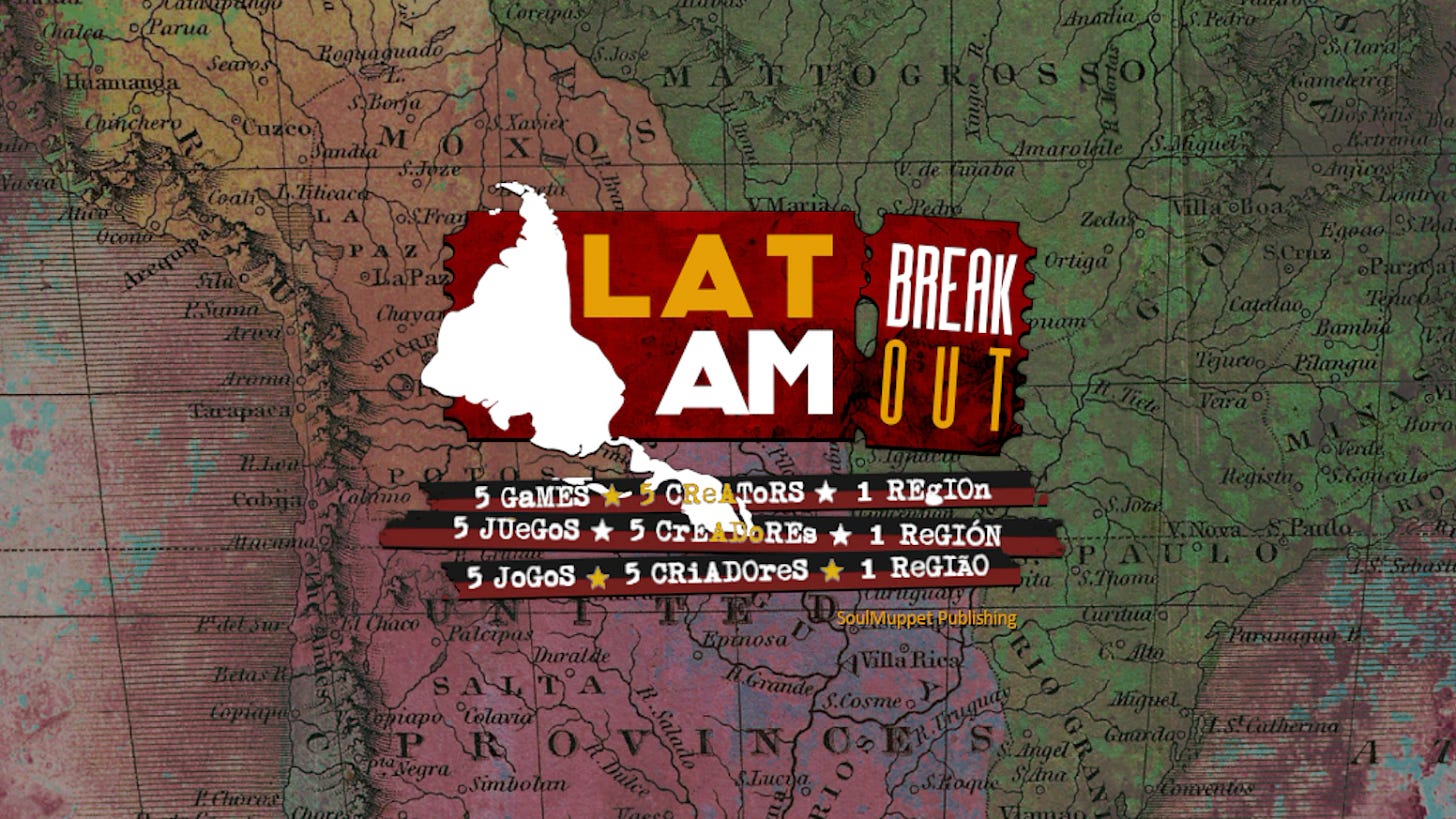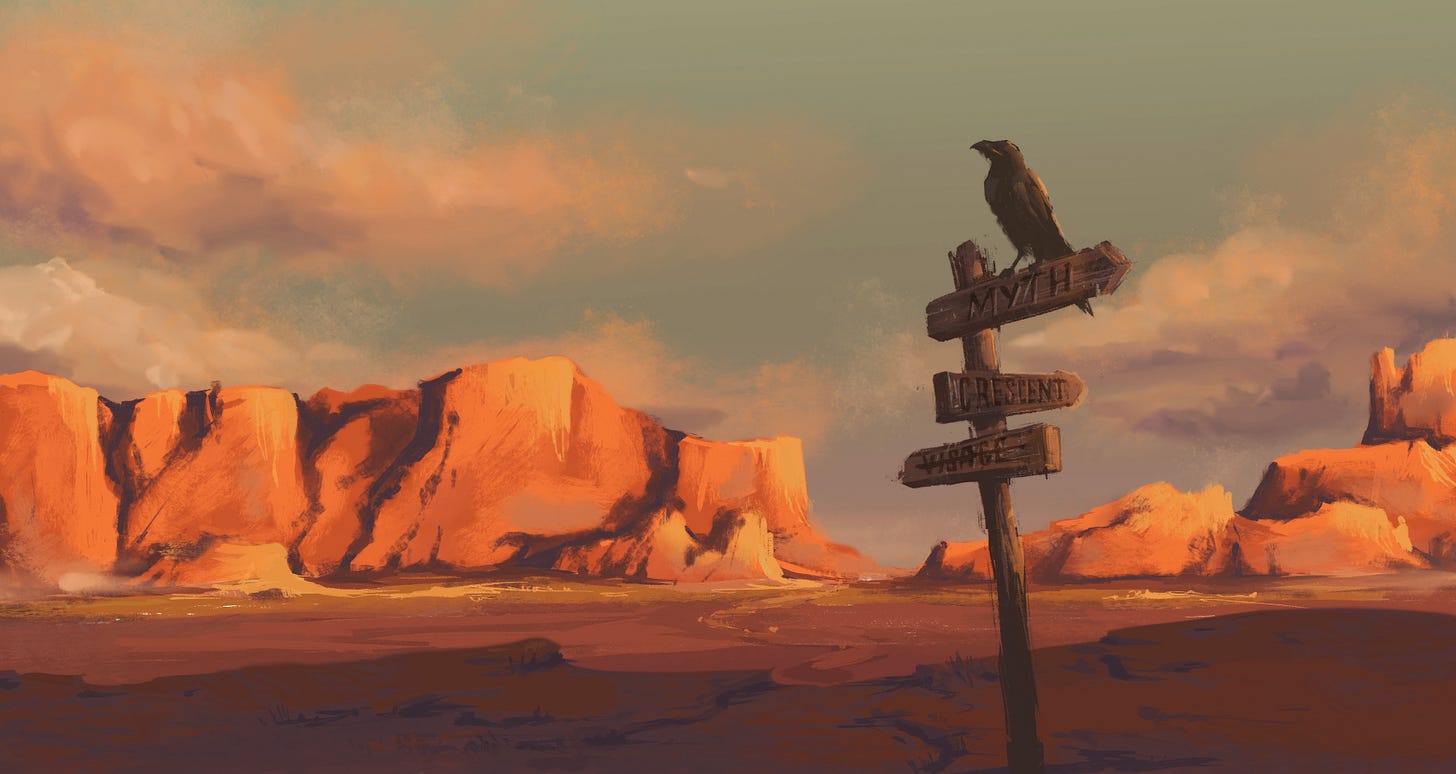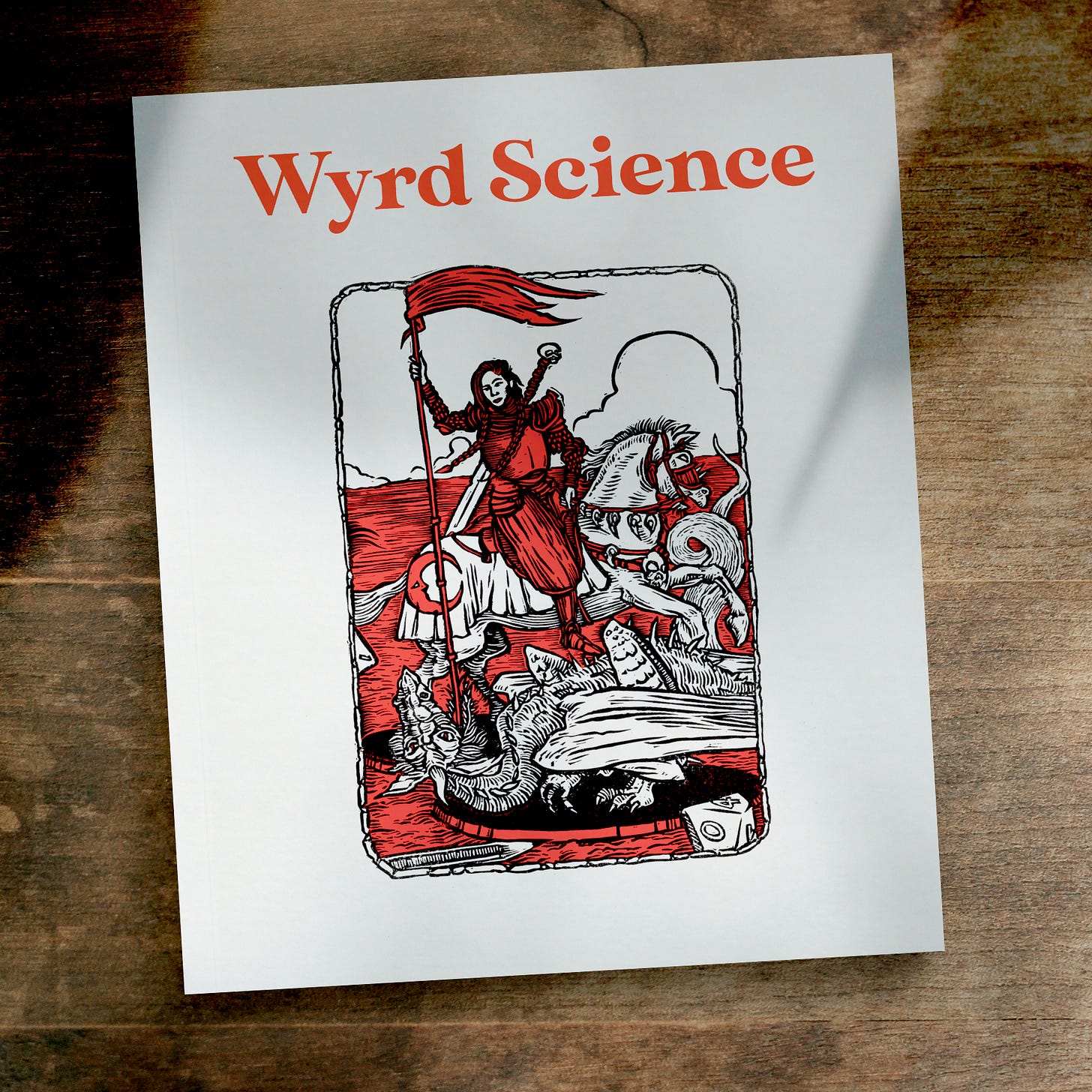Publish & Be Damned: SoulMuppet Publishing
We speak to SoulMuppet Publishing's Zach Cox about their new RPG, Inevitable, that is Kickstarting now and the trials and tribulations of getting game books into people's hands...
Launched in 2018 British publisher SoulMuppet Publishing have successfully navigated both the RPG boom and global turmoil of the past few years to establish themselves as one of the most forward thinking indie publishers on these tomato-less isles.
With a new game, Gangs of Titan City, just out and another, the doomed Arthurian Western Inevitable, crowdfunding at the moment we decided it was time to catch up with the company’s co-founder Zach Cox and talk about the lessons they have learned from five years of getting RPG books into people’s hands.
Hello Zach, so first of all please tell us about yourself and what it is that you do at SoulMuppet Publishing?
I am the co-founder of SoulMuppet Publishing, a UK based independent publisher of roleplaying games, mostly sad ones about how capitalism is bad. You might know us from Orbital Blues, Best Left Buried and Gangs of Titan City, as well as the forthcoming Inevitable.
I also work with my pals at Rowan, Rook and Decard, where I’ve been a producer and project manager on stuff like Orc Borg, Hollows and DIE.
What was your gaming background and what prompted the move from player to game designer and publisher?
I grew up in Nottingham and was very into Warhammer, so I started my RPG career at a very young age, playing a WFRP 2e campaign very badly when I was about 10. I then took about 10 years away from RPGs. Due to an extended period where the wifi broke and we didn’t have much money to drink with, I relapsed hard in my second year of uni, buying a second-hand three book set and then immediately running a 14 day, 11 session D&D campaign with it.
I then fell into the ‘Old School’ scene through the rampant blog scene at the time, which everyone was being very loud about just after the death of the final days of G+. I got annoyed by dying all the time while playing B/X Essentials and Maze Rats, so I wrote a fantasy horror Maze Rats hack called Best Left Buried with my friend Ben Brown. The rest is history.
Before you released Best Left Buried did you have any prior experience of the publishing world?
Absolutely none! Before I was an RPG publisher, I did an economics degree at the University of York, worked in a call centre and did some Data Science at an evil FTSE 100 data company that will remain unnamed.
At the start did you have ambitions for the company itself, or was it just a vehicle to get Best Left Buried out into the world?
For the first few years SoulMuppet was mainly an outlet for my personal creative output, which at the time was Best Left Buried and its various adventures. Though we were looking at Orbital Blues pretty soon after, and then more games of that ilk.
While running the business supporting those games, I realised I had built a pretty well vertically integrated business. I understood printing, marketing, distribution and financial stuff, and had a small pile of money around to help people who didn’t.
What started off as a ladder building exercise for my friends, turned into something where I could use my skills and resources to make money for marginalised people who wouldn’t be able to otherwise. This moment put the Publishing into SoulMuppet Publishing.
Most of the 3rd party publishing work we’ve done since has been focused on those marginalised folx: people from the global south, such as #RPGLATAM and #RPGSEA, LGBTQ+ people and those with low incomes and poor access to market. We’re getting stuff into print that might not happen otherwise, and it’s making money for them which is important.
We’re now starting to push into our “Kickstarter as a Service” thing, where SoulMuppet is literally offering zero cost fulfillment to indie RPG companies. You send us books, then we send your backers discount codes and have them check out via our store. This is another thing that drops the barriers to entry for running a successful project.
Get your books made, send em to SoulMuppet, and we’ll do the rest in exchange for a couple hundred of your customers checking out our store, and maybe signing up to our mailing list or buying a copy of Orbital Blues.
We also do a great job of handling taxes, tracking and customs and can also help with printing, in terms of finding a printer, getting your book built correctly and checking files.
This allows creators to focus on making the books, instead of setting up or hiring a multinational fulfillment company at great expense in time and money. This is a good example of us building a ladder, and giving other people an access to it that’s a win win for everyone.
We’ve got an open door for conversations about what it takes to make a project successful, and want to offer help to people when we can. If Matt or I don’t know the answer to the question, we intend to find out. We tend to keep short conversations free, and longer ones cheap.
As you mentioned, last year you published the LATAM Breakout series, which featured several completely different creative teams from Latin America, how did that come about?
So back in 2021 I started working with Matt Sanders, who runs Sealed Library. Matt did a bunch of webstore stuff for me, such as purchasing indie stuff, and we got talking to some creators in Latin America. We wanted to highlight some of these creators, there was an amazing scene of people creating great stuff, and many of them didn’t have access to the market or a budget to spend on artists, editing and layout, never-mind print runs.
You literally can’t run a Kickstarter if you don’t live in the Global North. We saw these folx and wanted to work with them, and then LATAM Breakout came about. 5 games by 5 creators, all of which were slick as hell.
All your games, at least in terms of premise and setting, are quite different. Is there a thread between them, something that you think marks them all out as a "SoulMuppet game"?
I spoke about this on a podcast with Kayla Dice recently (check out This Is Your Lifepath). For me, all our games have some really horrible rotten theme about not being able to escape a cycle. Some of the best hitters are workers rights, mental health, capitalism and a looming fear of death.
In Best Left Buried, you play professional dungeoneers getting paid to go into ruins by colonialist banks, then either getting eaten by monsters or going mad. Risking your body and brain to make 10% of the profits your capitalist bosses get to take home.
In Orbital Blues, you play gig economy workers with depression, who can’t afford to pay the mortgage on their spaceship. You’re trapped in poverty, forced to turn to crime, and in character creation you choose why you are sad and then get XP for it. There is also loads of music. .
In Gangs of Titan City, you play desperate gutter-scum trying to carve out a slice of a city that is already owned by other desperate gutter scum. You have to push yourself to even survive, and everything you do has consequences that will catch up with you one day, the only question is how long it will take.
In Inevitable, you are playing Cowboy Arthurian Knights in the dying days of your civilisation, whose doom has been foretold by certain prophecy. You can’t escape this, so you get to decide the time and place of your death, and how virtuous and chivalrous you choose to remain as you struggle against impossible odds.
Basically, it sucks to be a character in a SoulMuppet roleplaying game. You can play someone who is cool and you can “win” in the short terms, but it ain’t gonna last long. The mechanical engines of our games revel in your suffering, and trap you in cycles you can’t escape.It’s a little like real life.
In the five years you’ve been going the industry’s grown and grown but, as illustrated by your work with Latin American creators, not entirely equitably. What are your thoughts on the state of it today?
Things have gotten worse and better. I think 5 years ago the industry was much more dependent on Kickstarter. Don’t get me wrong, it’s still where all of the big hits and money rushes happen, but the number of dependable businesses that have weaned themselves off it is increasing.
Exalted Funeral is a big entity now, and other amazing indie webstores are springing up in their wake. Just in the UK, there are places like ourselves, Peregrine Press, LootTheRoom, Igloo Tree, Sealed Library, Dungeonland, Antipode Zines, All Rolled Up and Rook’s Press.
Then internationally you’ve got Floating Chair, Spear Witch, Monkey’s Paw, All The Problems In The World, Knave of Cups, Third Kingdom Games, TheLostBayStudio, Ratti Incantati and hundreds of more I can’t think of.
Those places existing and being a place to get cool indie shit online with sensible shipping and wide ranges is new and really fucking exciting. If you’re buying RPGs and these aren’t where you’re shopping for bangers, they should be.
DriveThruRPG hasn’t done anything in years, and there’s better quality and cheaper PoD solutions if you want them. Itch is great in a lot of ways but really missing discoverability and royalty splits. Getting a webstore and owning your own mailing list is such a big thing, and a step I think every RPG business should try to do if you have the skills and time.
I think brick and mortar stores have been left in the dust by really lacking distribution by the big companies, and more of them should be speaking to us and stocking stuff that isn’t D&D or big licensed hardbacks on their shelves. That’s the place I feel like we really need to improve as an industry. ‘Real people’, not the ones being loud on Twitter, are the secret money spenders, and they go to local game shops. The real secret is learning to help stores sell products, so they come back for more after your first sale.
I feel like good relationships with stores is such an untapped market. The first indie company to do a good job of getting a really cool book on every game shop in the world is going to win big. I’d like that to be SoulMuppet, Matt and I are certainly working on it.
We've just had the big blow-up over the D&D Open Game License, what do you think might be the long term effect, if any, on the industry?
I’m so utterly uninterested in OGL drama, but I have had to delete several very spicy takes.
I think the OGL and SRDs are weird, totally aberrant legacy things that wouldn’t exist if Wizards made them now. Is there any other corporation in the world that lets you make money with their intellectual property for free? The whole OGL sort of feels like a legacy legal loophole.
The moment Amazon bought a Prime Show of Critical Role, the OGL was dead in the water. Jeff Bezos making a cool couple of million from Bigby's Invisible Hand? That's not allowed to happen. It was weird before it happened, and the whole thing was done once that deal occurred.
I think anybody building their business on OGL territory was always playing with fire. If you’re doing a personal project, or a side hustle, then yeah sure, sit in there. But if you’re running a business with salaried employees, accountants, lawyers, a marketing function and a multi million pound turnover that is reliant on WotC letting you make money from them for free? That doesn’t seem safe to me.
Moan all you want about what 'irrevocable' means, but unless someone has the resources to get into a proper extended legal battle over if they can remove it then they can. And none of us do. Maybe Paizo is big enough to have an in-house attorney or two?
Have you seen an uptick in interest in your titles since it all kicked off?
We’re doing fine. We tend to always do fine. Drama on the internet doesn’t affect that because wherever possible I choose to make games instead of loud noises. When I do make loud noises, it’s about the games not drama.
SoulMuppet has a completely open license for 3rd party creators to develop and publish material for your games, right?
All our published games have licenses, because I think it’s needed if you want an indie game to do well. MÖRK BORG, Mothership, Troika! and Mausritter are all a cut above the rest and a bulk of that is their active third party scenes operating under free licenses.
Where it makes sense all our stuff will have a license. Inevitable might not, because it's a tremendously tight setting that I feel doesn’t need anything adding to it.
I also grow suspicious of anyone who wants to set up their own fancy equivalent licensing arrangement in the wake of this all when creative commons or actual open licensing exists. That’s not what I think indie licensing should look like.
I think Troika! is the gold standard for this and it’s why our license looks exactly like Melsonian Arts Council’s. I would like to say thanks to Dan for always being a straight shooter and letting me nick his license.
Most, if not all, your games have been launched via Kickstarter. What advice would you give someone approaching their first project on there?
Most people think being good at Kickstarter is about making money, but the real answer is that it’s about not losing it once you make it.
Make something cheap and low scope with a £500 target that you can afford to make mistakes on without bankrupting yourself. I think a lot of people want their first project to make five or six figures, but this is probably a bad idea unless you know what you’re doing.
Imagine your project goes wrong and your costs jump by 20%. Let’s say you’re making a 40 page zine that you hired an editor and commissioned a couple pieces of art for and did some printing, and you need £500. If it goes wrong and you need to do a second print run, you’ll need to spend another £100. Your project budget just went up 20%.
If that happens on a £500 project, that 20% project bump will probably be fine. If you make 10 times that, that project bump is a thousand pounds, which kinda sucks. If you make 10 times that, you’re going to go bankrupt.
More than a few big studios have sunk because their first hit went badly. Learn how to do things when you can still afford to fail, and then you’ll be able to act without fear when you eventually reach the big leagues.
Once you've dealt with the small matter of funding, writing, editing, printing, publishing and distributing a game, what do you think is key to then ensuring it has a post-release life?
This is something we’ve grappled with a lot, especially over the pandemic when people weren’t placing face to face. Recently our mantra with this is that successful games are ones that people play. We’re still working on the answer to that one.
The easy answer is ‘support your game with modules’, like adventures or sourcebooks or whatever, but this costs a heck of a lot of money. People playing games on stream is also great, we try to support this with affiliate links, asset packs and advertising, but unless you can land a big stream it might not do much.
The smart thing to do might be to get really good VTT support and an organised play structure (Goodman Games have a great one), but those are such hard things for small companies to put together. I’m hoping it’s something SoulMuppet are going to get better at, and we’re keen to learn more about it.
Generally speaking, what would you say are the key lessons you've learned over the years. Has there been anything that you wished someone had warned you about?
The big secret is about designing products that are easy to fulfill. You gotta make the thing easy to design, easy to print and easy to fulfill.
Stay 1000 miles away from anything in a poster tube. Don’t overcommit on fancy stretch goals, especially if they’re in print. Keep your componentisation low: a hundred pamphlets, dice and six different bookmarks will sink you on time and pick rate, and just make replacements more likely because you put the wrong thing in a damn box.
Final super niche one, if you’re in the UK, worry about what might happen if you suddenly need to charge VAT on something cool like a cherry red cassette tape in a rave case, just in case your project then pushes your business over the VAT declaration line.
Weirdly specific example, I know, but you gotta watch out for stuff like that.
Do you think there's enough mutual support in the industry, especially on the publishing side? It feels like there's a lot of advice around on designing a game but less around the more mundane yet important bit of getting it into people's hands...
Making books is easy. Getting books to people is hard.
The place you want to be for advice on that is the RPG Bookseller’s discord. Lots of indie RPG people talking a heck of a lot of shop. It’s mainly about distribution, marketing and fulfillment, exactly the kind of stuff most budding publishers wanna talk about.
The best technique for this is to find a person you think does good work and ask them for help. I would have crashed and burned pretty early if I couldn’t ask my fellows for work, and I offer the same to others where I can.
The last few years have thrown up some particularly tricky problems for publishers, what have been the biggest challenges you've faced?
The main thing is that books have got 15-20% more expensive to produce, and incomes haven’t gotten any better. Most places right now are swallowing the margins. We’ve been lucky because we've been able to get around price increases by simply enjoying bigger print runs and bigger economies of scale. The price rises from paper, electricity and shipping all getting more expensive are almost being cancelled out from printing 5000 books not 500.
A lot of indie outfits are scared to charge what their books cost to print. We tend to aim for 5-10 times print cost, depending on the product, and if we’re selling it into wholesale. People also sometimes charge shipping to customers with a subsidy, which you shouldn’t ever do! You need to charge it at a 3-5% safety margin for when stuff goes wrong.
Finally, what’s next for SoulMuppet Publishing, and where do you hope to see the company in the next five years?
Inevitable is coming soon. The cowboys will be sad. That’ll be pretty good. After that, we’re doing another Orbital Blues thing, probably about spaceships and maybe drag racing around a black hole.
There are unconfirmed rumours about a Garden of Ynn remaster with a lot of white space in it racing around Reddit. After that, I’m going to take on World of Darkness in a knife fight in a dark alley and probably lose.
In five years? I hope to have a couple more folx working with us, good circulation onto the bookshelves of friendly local stores for indie RPGs across the board, and have at least a couple of trans folx on a beach somewhere drinking mojitos whilst entirely living off SoulMuppet royalties.
This interview originally featured in Wyrd Science issue 4, if you haven’t yet why not buy yourself a copy that way you get a cool magazine and we get to make more of them…










